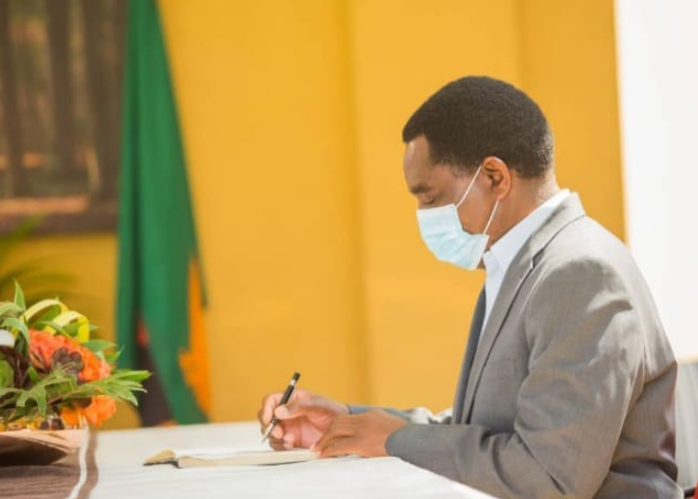
The inauguration of former opposition leader Hakainde Hichilema as Zambia’s new president is an opportunity to turn the tide on the country’s worsening human rights situation, Amnesty International said today. The organization urged the president-elect to prioritize protecting freedom of expression and association, take decisive action to end abuses by police and place socio-economic rights on his agenda, including tackling inequality, poverty, unemployment, collapsing healthcare system and poor education funding. Hakainde Hichilema will be inaugurated on 24 August in Lusaka.
Under the outgoing president, Edgar Lungu, Zambia’s human rights record has deteriorated sharply. Opposition leaders and activists have been arrested and detained, prominent media houses have been shut down, and police crackdowns on peaceful protests have led to several deaths.
The inauguration of Hakainde Hichilema must spell the end of a dark era of repression in Zambia
Deprose Muchena, Amnesty International’s Director for East and Southern Africa
“The inauguration of Hakainde Hichilema must spell the end of a dark era of repression in Zambia,” said Deprose Muchena, Amnesty International’s Director for East and Southern Africa.
“We are calling on the new administration to place human rights at the centre of their agenda, including by removing restrictions on the peaceful exercise of human rights, and ensuring accountability for past violations in order to end the culture of impunity. Years of intensifying repression have pushed Zambia to the brink of a human rights crisis- now is the time for a decisive break with the past.”
Systematic crackdown on human rights
The rights to freedom of expression and peaceful assembly had come under increasing attack in Zambia, particularly over the past five years, with opposition leaders and activists jailed and at least five people killed by police since 2016.
The new administration must place human rights at the centre of their agenda, including by removing restrictions on the peaceful exercise of human rights, and ensuring accountability for past violations in order to end the culture of impunity
Deprose Muchena
Under President’s Lungu’s administration, authorities weaponized the law to criminalize peaceful dissent, charging critics with a wide range of offences including criminal defamation, incitement of public disorder and sedition.
For example, on 9 March 2020, police arrested a 15-year-old boy in Kapiri Mposhi, and charged him with three counts of criminal libel after he allegedly criticized President Lungu on Facebook.
Media outlets came under attack during Lungu’s presidency. In June 2016, one of Zambia’s leading daily newspapers, The Post, was shut down and liquidated over a disputed tax debt. The closure of the newspaper, which was known for its critical investigative work against government, was preceded by state-sanctioned violence against staff, including the beating the owner of The Post newspaper, Fred M’membe, his wife Mutinta M’membe and the newspaper’s Deputy Managing Editor, Joseph Mwenda.
Police abuses
The crackdown also saw an escalation in excessive use of force by the police, which has been fatal in some cases. On 22 December 2020, police shot dead two unarmed people at a gathering of opposition supporters.
Several people had gathered to show their solidarity with Haikainde Hichilema, who is the leader of the United Party for National Development (UPND), when he was summoned for questioning at police headquarters in Lusaka.
State prosecutor Nsama Nsama, who was not part of the gathering, was shot dead while buying a meal at a nearby restaurant, while Joseph Kaunda, a UNPD supporter, was shot by police as they dispersed the crowd. A day earlier, the government had publicly urged police to use ‘any means necessary to maintain law and order’ when dealing with opposition supporters.
An investigation by Zambia’s Human Rights Commission established that the order to shoot came from Lusaka Police Commissioner Nelson Phiri, who was removed from service but not charged with any offence.
Hakainde Hichilema has an opportunity to pull Zambia back from the brink. Tackling the injustices of the past is a crucial step towards building a better future for the country
Deprose Muchena
In 2018, student Vesper Shimuzhila died when police threw a tear gas canister into her room, during their violent dispersal of a student protest. Her family were given $25,000USD in compensation but no officer has been charged.
“President-elect Hichilema must adopt a bold and decisive human rights strategy to ensure respect for the human rights of all Zambians, including by tackling impunity and bringing perpetrators of past violations to justice,” said Deprose Muchena.
“Hakainde Hichilema has an opportunity to pull Zambia back from the brink. Tackling the injustices of the past is a crucial step towards building a better future for the country.”

0 Comments